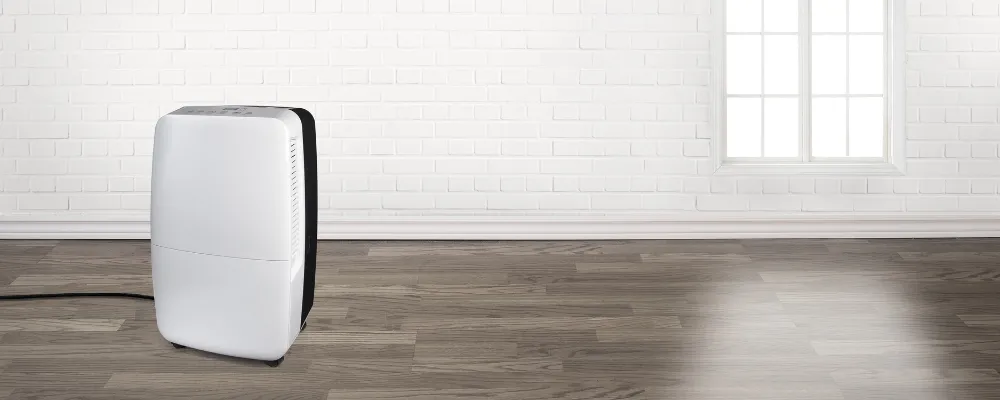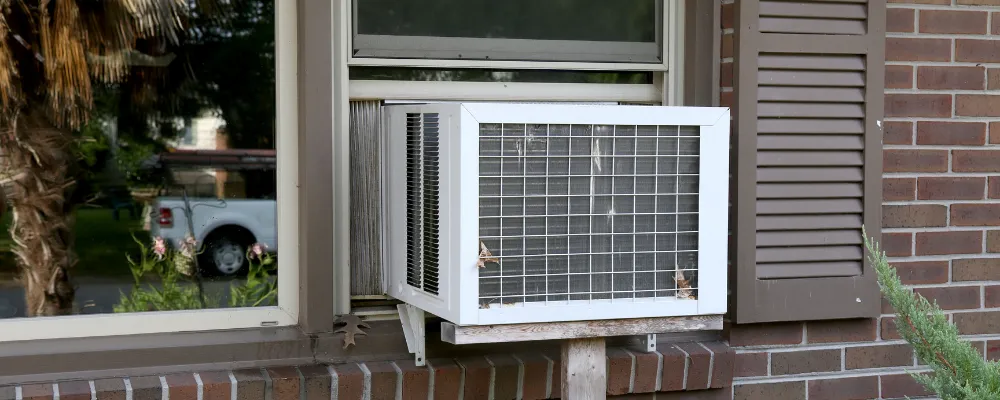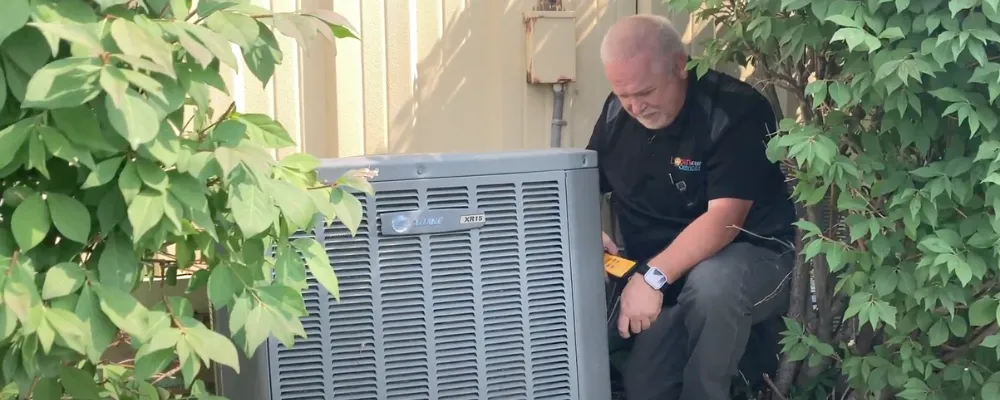If you need a new AC unit, you’ve probably considered purchasing one from a store and installing it yourself. After all, purchasing a unit from a store seems cheaper up front, plus you don’t need to worry about scheduling a time for installation.
But is it really cheaper to buy your air conditioner from the store and install it yourself? Let’s explore this method of HVAC system installation and what to know before purchasing a unit on your own.
Understanding the Basics of Air Conditioning Units
When you enter a local home improvement store or navigate an online site, one thing you may notice is the variety of air conditioning units available. From a window air conditioner to split system air conditioners, portable air conditioners, and much more, there may be a plethora of choices.
While the type of air conditioner you need largely depends on the specifics of your home, it’s essential to grasp the basic workings of an air conditioning unit – this is the key to purchasing an AC unit that best suits your needs. Explore your ac replacement options below and learn if these systems can be purchased at your local store.
Central Air Conditioner
Central air conditioners are large, whole-house cooling systems that are designed to cool an entire building or home. They consist of two main components: an outdoor unit (condenser) and an indoor unit (evaporator coil). Here’s how they work:
- Outdoor Unit: The outdoor unit contains the condenser, compressor, and fan. It is usually installed outside the house and expels heat from the refrigerant.
- Indoor Unit: The indoor unit is connected to the outdoor unit through refrigerant lines and is usually installed in a basement, crawlspace, attic or a dedicated utility room. It contains the evaporator coil that cools the indoor air.
Central air conditioning systems aren’t typically available for purchase in a retail store. Reputable brands are only available to buy through a licensed contractor to ensure professional installation for both operational warranties and safety reasons.
Split Air Conditioner
Split air conditioners, also known as ductless mini-splits, are a type of air conditioner that consists of two main components but doesn’t require ductwork for cooling. They are often used in situations where central air conditioning is not practical or possible. Here’s how they work:
- Outdoor Unit: Similar to central air conditioners, split air conditioners have an outdoor unit containing the condenser, compressor, and fan.
- Indoor Unit: The indoor unit is mounted on the wall or ceiling of the room to be cooled. It contains an evaporator coil and a fan to blow the cooled air into the room.

Depending on the brand of the split ac, these may also be hard to come by in a retail or big box store. Some split ac equipment may be available to purchase online directly through a manufacturer, but it is always recommended to purchase and install a system like this through a licensed HVAC contractor to make sure that you are getting the most out of your investment.
Portable Air Conditioner
Portable air conditioners are standalone units that can be moved from one room to another. They are designed to cool a single room and don’t require permanent installation. Here’s how they work:
- Single Unit: Portable air conditioners consist of a single unit with an exhaust hose that must be vented to the outside through a window or sliding door.

Portable air conditioners are a good temporary solution to a hard to heat/cool area. If you don’t plan to live in the home long, a portable ac can be utilized in your space, and then taken with you to your next home. If you are in your forever home, consider upgrading your central HVAC system or add a split system to your room for ultimate long-term comfort.
Window Air Conditioner
Like portable air conditioners, a window ac is a standalone unit. While you could move it from room to room, once installed through the window, it typically remains there for the entirety of the cooling season. They also function to cool a single room and without the intention to permanently install the unit. Here’s how they work:
- Single Unit: Window air conditioners consist of a single unit with an exhaust that vents out the back side of your window.

Window air conditioners are a low upfront-cost solution to a hard to heat/cool area; however the can be expensive to operate for single-zone air conditioning. If you have a need for a window ac application and you plan to be in your home for many more years, consider upgrading your central air conditioner (if you have one) or add a split system to your room or as a whole-home solution for ultimate long-term comfort.
Shopping In-Store for AC Unit
While you can understand the basics of different types of AC units, the reality is that selecting the right conditioner is a nuanced process. Unfortunately, if you’re shopping at a major home store for a unit, you likely won’t have a specialized salesperson to help you make the right choice. This could lead to potential misinformation or lack of knowledge about the product. And you don’t want to end up purchasing a unit and transporting it home only to find that it’s the wrong system for your home.
Is Buying From a Store the Right Choice?
Purchasing an AC unit can be a large investment, and you want to ensure you choose the right path before deciding. Let’s dive deeper into the potential drawbacks of buying an AC unit from a store.
Potentially Higher Prices
Unlike buying an AC unit from a professional company where you can discuss different deals, purchasing an AC unit from a store limits one’s capability to get the best deal. Big box stores, due to their overhead costs like staff wages, utility costs, and property rents, often have to charge more for their air conditioning units.
Limited Selection
Another disadvantage of buying from a store is limited selection. Big box retailers typically stock a limited range of units, focusing on popular models and sizes. This can shackle your freedom to choose from various AC units that best suit your specific needs.
Limited Product Knowledge From the Staff
The staff at the big box stores may lack comprehensive knowledge about the air conditioning units they sell. Their advice may be general, as opposed to an AC specialist who can guide you on specific features and benefits, as well as provide insights based on your home’s unique needs.
They Do Not Have Professional Installation
While local home improvement stores may sell AC units, they do not offer professional installation services, and they may connect you with a contractor that doesn’t meet your standards. Always make sure that you have a say in who performs your system installation, especially when dealing with central ac and split systems. Incorrect installation can affect the efficiency of your AC unit, lead to frequent breakdowns and even shorten its lifespan.

Warranty Services
A warranty is crucial when purchasing an air conditioner. However, when you purchase a unit from the big box store, you might have to deal directly with the manufacturer in case of a product defect or issue. Some consumers have found this process to be cumbersome and time-consuming. On the other hand, professional HVAC companies honor warranty claims directly, offering better customer service.
Overall, when purchasing an AC unit, whether a ductless air conditioner or central air conditioning unit, it is advisable to work with a professional HVAC company. From customer service to quality installation, the professionals can help you throughout the process to ensure you get the best value.
What About Buying Online?
Maybe you’ve decided that buying an air conditioner in-store isn’t the best option. So what about buying an AC unit online? In the digital age, online shopping is extremely popular due to its convenience. Whether browsing the options from the comfort of your home or checking out the latest air cooling system during your lunch break at work, purchasing an air conditioner unit online can be done anywhere, anytime.
Furthermore, online platforms usually provide extensive information and specifications about their products, so you may feel that you fully understand the unit you’re purchasing.
Although shopping online for an AC unit may seem better than purchasing from a contractor, there are still some drawbacks to consider:
- Inaccurate Product Information: While many online retailers provide detailed product descriptions and specifications, there is a chance of encountering inaccurate or incomplete information. This could lead to buying an AC unit that doesn’t meet your cooling needs or doesn’t fit the space you intend to use it in.
- Limited Inspection: When buying online, you can’t physically inspect the AC unit before purchasing it. This means you won’t be able to check its build quality, overall condition, or any cosmetic defects that might affect your satisfaction with the product.
- Delayed Delivery: Depending on the shipping method and your location, delivery times for online purchases can vary. If you need the AC unit urgently, delays in shipping or logistics issues may be inconvenient.
- Installation Issues: Some AC units require professional installation, especially central or split systems. When buying online, it will be challenging to find a reliable local installer or get the required technical support if you encounter installation problems.
- Returns and Warranty Concerns: Returning an AC unit can be a cumbersome process, especially if it’s a large and heavy item. It’s crucial to understand the seller’s return policy and potential shipping costs if you need to return the unit. Additionally, warranty claims might be more complicated when dealing with online purchases.
- Noise Levels: AC units’ noise levels can significantly impact your comfort. While some online retailers provide noise ratings, experiencing the actual noise of the unit before purchase is not possible online.
- Energy Efficiency: Energy efficiency ratings are essential for long-term cost savings. While you can find this information online, it may be harder to compare multiple units side by side or see energy usage demonstrations.
- Compatibility and Accessories: For split systems or window AC units, there might be additional accessories required, such as brackets, mounting kits, or extra components. Ensuring compatibility can be more challenging when purchasing online.
The Importance of Installation in Air Conditioning Unit Selection
While it may seem cheaper or more convenient to purchase an AC unit in a hardware store or online, the truth is that there’s many risks and potential problems associated with this method. When you partner with a professional HVAC company, they can recommend the best unit based on your space, and they can provide professional installation.
Proper AC installation is essential, as poor installation can lead to reduced efficiency, higher utility bills, system malfunctions, and costly repairs. There are also safety concerns to consider when an air conditioner has not been set up correctly. Hence, the importance of hiring a professional installer cannot be overstated.
About Logan Services
If you’re seeking quality HVAC services in Ohio, Logan Services A/C, Heat & Plumbing can help. Our team has over 50 years of experience in the HVAC industry, providing unparalleled customer service, AC and heat system maintenance, installation, repairs, and more. Let us help you find the perfect AC unit for your space so you can get the most out of your system. Contact us today to get started.
FAQs
What to look for when buying an air conditioner?
When buying an air conditioner, there are several important factors to consider:
- Size: First, determine the size of the unit based on the size of the room you want to cool. Choosing the right size is crucial for efficient and effective cooling.
- Cooling Capacity: Next, consider the cooling capacity measured in BTUs (British Thermal Units). The higher the BTU rating, the more cooling power the unit has.
- Efficiency: Energy efficiency is another key factor to look for. Look for units with an energy-efficient rating, such as ENERGY STAR certification, to save on energy costs in the long run.
- Noise: Noise level is also important, especially if you plan to place the air conditioner in a bedroom or living area.
- Other Features: Finally, check for additional features like programmable timers, remote control, and adjustable fan speeds to enhance convenience and customize your cooling experience.
What is the best time to buy an AC?
The best time to buy an air conditioning unit is typically during the off-season, which is usually during the fall or winter months. During this time, demand for air conditioners is lower, resulting in lower prices and potential discounts from retailers. Additionally, manufacturers often release new models in the spring, leading to discounted prices on the previous year’s models.
What questions to ask when buying an air conditioner?
When buying an air conditioner, it’s important to ask several key questions. First, inquire about the size and capacity of the unit to ensure it will effectively cool the intended space. Ask about the energy efficiency and SEER rating to understand its operating costs. It’s also essential to learn about the noise level and any additional features like programmable thermostats or remote controls. Inquire about the warranty and after-sales service to ensure peace of mind. Always keep in mind the reputation and quality of the HVAC company installing the system, as that will impact your investment immensely.





















